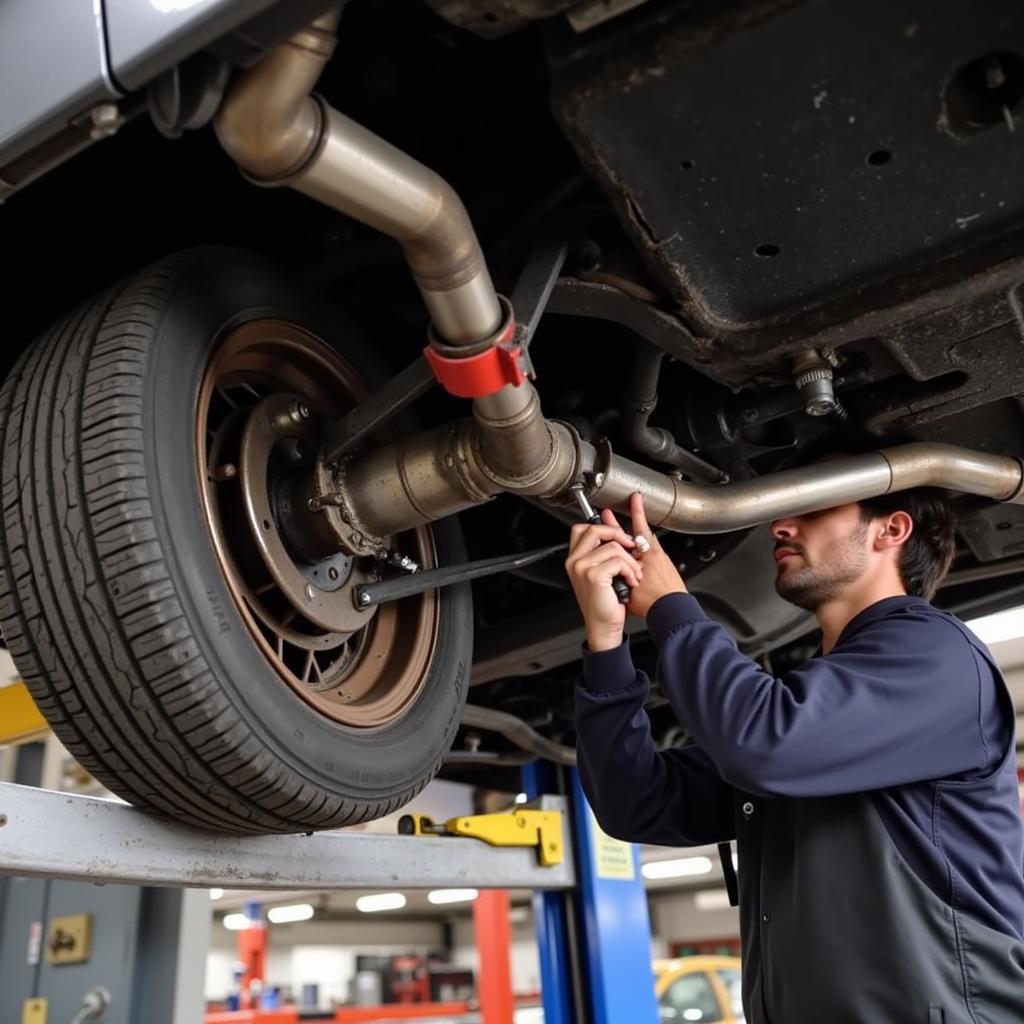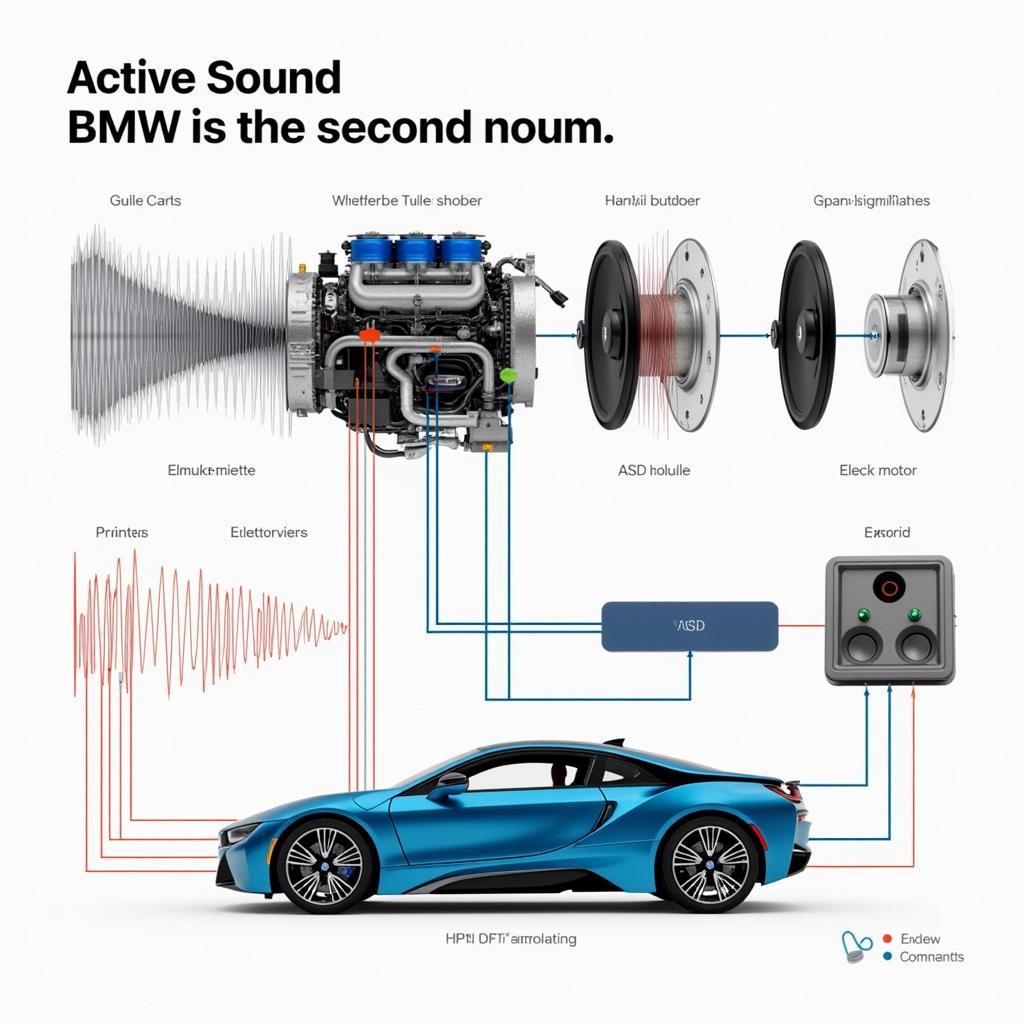The 2007 BMW 335i is renowned for its impressive performance and distinctive exhaust sound. However, understanding the nuances of this iconic exhaust note can be crucial for diagnosing potential issues and maximizing your driving experience. This guide dives deep into the world of the 2007 BMW 335i exhaust sound, covering everything from the stock system to common problems and aftermarket modifications.
The thrilling sound of the 2007 BMW 335i’s exhaust is a key element of its sporty character. This guide will explore the factors that contribute to this iconic sound, including the engine design, exhaust system components, and potential modifications. Whether you’re a car owner, mechanic, or simply an enthusiast, understanding the intricacies of the 335i’s exhaust can help you appreciate its performance and identify any underlying issues.
Understanding the Stock Exhaust System
The stock exhaust system of the 2007 BMW 335i is designed to balance performance and comfort. It features a series of mufflers, resonators, and piping that work together to manage exhaust flow and create a signature sound. The twin-turbocharged N54 engine contributes significantly to the exhaust note, producing a deep, throaty growl under acceleration. This characteristic sound is often described as a blend of performance and refinement, setting it apart from other vehicles in its class. Knowing how the stock system works is essential for troubleshooting problems and making informed decisions about modifications.
Common Exhaust Sound Issues in the 2007 BMW 335i
Several factors can affect the exhaust sound of a 2007 BMW 335i. Common problems include exhaust leaks, which can produce a hissing or rasping sound, and damaged mufflers or resonators, which can result in a louder, more aggressive tone. A rattling sound could indicate loose or damaged components within the exhaust system. Furthermore, issues with the turbocharger wastegate can sometimes manifest as unusual exhaust sounds. Identifying and addressing these problems early is crucial for maintaining optimal performance and preventing further damage.
What Causes the 2007 BMW 335i Exhaust to Sound Deeper?
A deeper exhaust sound in the 2007 BMW 335i can be attributed to several factors. Larger diameter exhaust piping and aftermarket mufflers designed for a deeper tone are common modifications. The engine’s tuning also plays a role, as adjustments to the engine control unit (ECU) can impact the exhaust note. Understanding these factors can help you achieve the desired exhaust sound while maintaining performance and avoiding legal issues.
Aftermarket Exhaust Options for the 2007 BMW 335i
A wide range of aftermarket exhaust systems are available for the 2007 BMW 335i, offering varying levels of performance and sound customization. Cat-back exhaust systems, axle-back exhaust systems, and downpipes are popular choices, each providing unique benefits and affecting the exhaust sound differently. Cat-back systems generally offer a more refined and balanced sound, while axle-back systems tend to focus on increasing volume and aggression. Downpipes can significantly alter the exhaust flow and turbo spool sound. Carefully researching and selecting the right aftermarket exhaust system is essential for achieving your desired sound and performance goals.
How to Diagnose and Fix Exhaust Problems
Diagnosing exhaust problems in the 2007 BMW 335i involves a combination of visual inspection and listening carefully to the exhaust sound. Look for signs of leaks, rust, or damage to the exhaust components. Using a diagnostic tool can help identify underlying issues with the engine or other related systems. Consulting with a qualified mechanic experienced with BMWs is recommended for accurate diagnosis and effective repairs.
 Diagnosing BMW 335i Exhaust Issues: A Mechanic Inspecting the Undercarriage
Diagnosing BMW 335i Exhaust Issues: A Mechanic Inspecting the Undercarriage
Maintaining the 2007 BMW 335i Exhaust System
Regular maintenance is crucial for preserving the performance and longevity of the 2007 BMW 335i’s exhaust system. Regular inspections can help identify potential problems early, preventing costly repairs down the line. Ensuring proper lubrication and addressing any rust or corrosion promptly can extend the lifespan of the exhaust system.
Conclusion
The 2007 BMW 335i exhaust sound is a significant aspect of the car’s identity. Whether you’re seeking to maintain the stock sound, diagnose a problem, or explore aftermarket modifications, understanding the intricacies of the exhaust system is essential. Proper care and maintenance will ensure your 335i continues to deliver its signature driving experience for years to come.
FAQ
- What is the typical lifespan of a 2007 BMW 335i exhaust system? The lifespan varies depending on driving conditions and maintenance but typically lasts 7-10 years.
- Is it legal to modify the exhaust system of a 2007 BMW 335i? Modifications must comply with local noise regulations.
- How much does it cost to replace the exhaust system on a 2007 BMW 335i? The cost varies depending on the chosen parts and labor, but can range from several hundred to several thousand dollars.
- Can exhaust problems affect the performance of a 2007 BMW 335i? Yes, exhaust issues can negatively impact engine performance and fuel efficiency.
- How often should I have my 2007 BMW 335i exhaust system inspected? An annual inspection is recommended, or more frequently if you notice any unusual sounds or changes in performance.
- What are some signs of a failing exhaust system on a 2007 BMW 335i? Unusual noises, decreased performance, and visible rust or damage are common indicators.
- Can I install an aftermarket exhaust system myself? While possible, professional installation is recommended for optimal fit and performance.
Are you experiencing issues with your 2007 BMW 335i audio system? Check out our guide: 2007 bmw 335i audio system
For more information on BMW maintenance and troubleshooting, explore our other helpful articles on CARDIAGTECH. We offer insights into various topics, including engine diagnostics and common BMW problems.
Need expert assistance with your 2007 BMW 335i exhaust? Contact us via WhatsApp: +1 (641) 206-8880, Email: CARDIAGTECH[email protected] or visit our workshop at 276 Reock St, City of Orange, NJ 07050, United States. Our 24/7 customer service team is ready to help.

